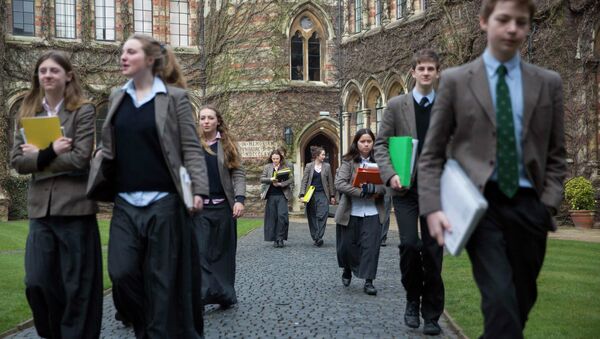Geraint Johnes, Professor of Economics at the Lancaster University, has shed some light on how the achievement gap is being calculated and what could be done to make this gap more narrow.
SPUTNIK: Can you explain what the achievement gap is, and how do we measure it?
Johnes: Well, this is something that the Education Policy Institute has put together in its report, and it reports every year, it's been doing so since 2011. They look at attainment data from the National people database, at age five in the foundation stage profile of kids who are entering school, then at age 11, at the end of key stage two, and then at age 16. At the end of compulsory secondary education, they look at GCSE grades across all subjects.
And they convert this data into the 'gain' that students have made over their time in education. So they've got an idea of how much progress they've made in each month up to the end of each of those stages. They compare the achievement of students across different socio-economic parts of the spectrum. So they're looking particularly at the gap between what they might term as 'regular' students and those who are 'disadvantaged'.
Those that are the 'disadvantage' are those who are eligible for the pupil premium so they're those that have qualified for free school meals, at any time in the last six years, those that have been in care for more than a day, and also some kids from service families. So they compare the disadvantaged students’ performance against those of other students. And in doing that comparison, they express the gap between the two in terms of how many months extra education the disadvantaged students would need in order to come up to the level that the other students are performing up.
SPUTNIK: And the Department of Education has said that currently 2.4 billion per year is dedicated to supporting poorer students. What does that currently entail in terms of policy?
Johnes: Well it does give extra results to schools that have a lot of students that qualify for the pupil premium, and then the schools are able to spend that extra money in whatever way they see fit in order to improve the performances of those that are at some kind of disadvantage.
But I think it's important to emphasize that it's not just a matter for education policy, this is a matter for social policy as well. If you look at the early years' scores, those kids that are coming into school at age five, there's a substantial gap already at that point of four and a half months. So those that are disadvantaged, are four and a half months behind other students in terms of their performance in the foundation stage profile. So there is already disadvantaged happening before the education system even kicks in.
Clearly, also there's a particular disadvantage, and people are lagging behind by a higher number of months, in areas that are characterized by large levels of social disadvantage. So if you look at where the gaps are larger, the largest gaps are in places like Blackpool, Peterborough and Rotherham. At the end of secondary education, there's a gap of more than two years in the level of achievement between the disadvantaged group and other groups in those towns. The gaps also tend to be larger in the north and the south and the largest increase in the secondary gap has been observed in Berry, Holton and Wigan. These gaps have implications for policy elsewhere in the government's agenda.
SPUTNIK: What policy do you think can be brought in to deal with this? You mentioned the geographical issues that come with the rates of disadvantaged achievement, what actually could be done?
Johnes: Clearly, education policy has a role to play. And one of the things that the EPI report highlights is that the disadvantaged students are at a disadvantage, right from the early years. So they're 4.5 months behind in the early years, 9.2 months behind at the end of primary education, and then 18 months behind at the end of secondary education. The disadvantage started early, and then the disadvantage is piled upon disadvantage.
With a second of those things disadvantage being piled on disadvantage, that's something that education policy can do something about. You can look at different subjects, subjects that are linear in nature. Like maths, where you have to have a base of knowledge before you progress and make sure that disadvantaged students do have that base of knowledge before they are expected to progress. Give particular support to them in those linear subjects.
There are other subjects like geography or history that are not linear in that way, and where you can pile on extra knowledge without requiring so much of a basis. So looking at different subjects in different ways, and how they're provided would be one thing that could be done in the education domain. But in social policies, it is particularly important to get rid of the causes of disadvantage. In the first instance.
SPUTNIK: We've seen a rise in online activism under the banner of 'Abolish Eaten', which takes a look at tackling elite schools with a private system. How do these schools feed into this problem?
Johnes: Oh, it's a relatively small proportion of pupils that go to elite schools or private schools around about 8%. I think you're identifying something that isn't the nub of the problem, what we need to do is tackle the schools that are primary schools in the state sector, and make sure that achievement for those pupils that are a disadvantage, particularly socio-economic disadvantage, they are supported. It's a matter of evening up then bringing down the level from the top end.




